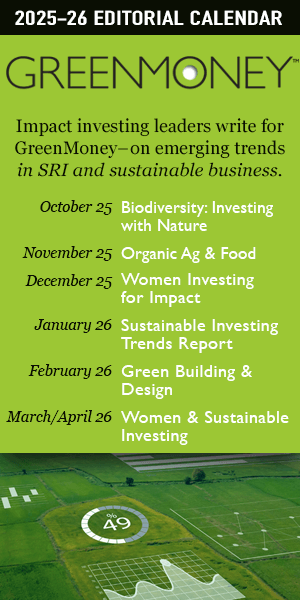 Above: Plankton Energy solar development in Hopkinton, MA
Above: Plankton Energy solar development in Hopkinton, MA
Gratitude Railroad has long maintained that impact investing is synonymous with a focus on the long-term, since we believe that the businesses and industries that will drive value for investors are those that will help build a more sustainable and equitable future. Consistent with this view and an understanding that the green transition would be full of both economic and impact potential, we have tracked and selectively backed renewables-related companies and funds since our inception more than a decade ago.
We have seen momentum in this space in recent years – including in 2023 and 2024, a time of overall decline in venture and emerging impact fund investing (areas on which we focus). Climate investing was not insulated from macroeconomic conditions, but investment in maturing industries, in particular, persisted.1 Renewables hit some notable high marks in the U.S. in 20232 – including that 42GW of new renewable power generating capacity was added to the grid; and the U.S.’s overall investment in the energy transition hit $303B, up 68% since 2020. These larger trends were mirrored within our own investor community, who demonstrated continued interest in climate tech deployment.
Policy also plays an important part in this story, as provisions from the Inflation Reduction Act (IRA) and Bipartisan Infrastructure Law designed to stimulate climate investment are being implemented. We have seen this first-hand as tax credits, government-backed lending facilities, and grant programs have all shown up in early-stage business models and new fund strategies – as “tailwinds” for sustainable companies that are innovating solutions for expanding consumer and business markets. Indeed, the policy changes contributed to two of our recent moves: expanding our investment in solar and investing in EV (Electric Vehicle) charging. These both fit under our climate justice investment thesis, which engages a dual lens of greenhouse gas emissions and social equity.
Expanding Solar Access
Gratitude Railroad made its initial foray into solar in 2020 with a seed-stage investment in Solstice, a community solar subscription company with a strong justice orientation. (Community solar allows customers to subscribe to a local installation in a common space, such as on a school or warehouse facility, extending the benefits of lower energy bills to low- and moderate-income customers and people living in multifamily housing.) We were excited by the founders’ commitment to democratizing solar and to using key organizing principles, alongside technology, to solve customer acquisition and management pain points. The company was later acquired by Mitsui & Co., and continues to be a leader in community solar subscription services and more broadly in solar access.
In 2021, Gratitude invested in PosiGen, a national leader in residential solar for low- and moderate-income (LMI) households which represents 40% of the US residential solar addressable market but has <1% penetration to date. The company utilizes a proven savings-based underwriting approach for customers who might not meet traditional FICO or income requirements. This was a co-investment alongside Gratitude\’s sister organization, Builders Fund, which led the Series D. Since our investment, PosiGen has deployed 50MW across more than 6,000 systems, grown to 600 employees in 8 states, and gone on to raise ~$200M in additional equity from leading investment firms such as Magnetar and Activate.
Unlocking the Potential of Community and Mid-Market Solar
Meanwhile, we also continued to track the community and small commercial solar spaces due to their favorable impact profile: in addition to lowering energy costs and expanding access, these projects can make grids more resilient, create local jobs, build on existing structures, and enable community organizations to meet their climate goals in a visible way.
While community and mid-market solar have been growing over time, they represent a part of the market that has been chronically underinvested. The reasons for this are multifaceted, but one challenge has been procuring a part of the typical solar capital stack known as “tax equity” (funding provided by an investor who can benefit from federal tax credits). Tax equity investment historically had high transaction costs and was viewed as more attractive for projects that are larger in scale, exacerbating cost of capital barriers for smaller projects.
The Inflation Reduction Act’s provisions have opened up this mid-market in important ways. The investment tax credit, first enacted in 2006, was extended at 30% for qualifying projects through 2032. The law also made the tax credits “portable,” i.e., able to be transferred to an entity that can use them, reducing barriers to tax equity investment which is particularly impactful for this mid-market. Moreover, it established tax credit “bonuses” – additional credits for projects located in low-income and/or “energy” communities, for example. These tax credits can now collectively account for more than half of the cost of a solar project – significantly lowering the cost of capital for project development.
These favorable changes in community and mid-market solar inspired us to launch a new partnership with Plankton Energy, a solar developer with a track record in this space. Gratitude and Plankton are now working together to leverage our joint capabilities in solar development and financing, asset management, and impact to support the expansion of community and commercial solar projects in the northeastern United States and beyond.
Investing in Electrifying Everything
The flip side of creating a renewable-centric grid is of course ensuring that previously fossil-fuel-dependent industries utilize it, including by electrifying target sectors. The IRA and infrastructure laws were partly designed to accelerate adoption of grid-utilizing sectors, including through corporate and consumer tax benefits. We are seeing an increasing number of companies that are leveraging this policy moment and innovating to accelerate the adoption of and access to electric vehicles, heat pumps, and related domestic US manufacturing – all of which are growing in terms of market share.
In the EV space, for example, we recently invested in it’s electric, an innovative curbside EV charging solution for dense urban neighborhoods. It’s electric’s charger is a sleek design whereby drivers bring their own cord to eliminate curbside clutter and a significant challenge of shared chargers: broken cords. In addition, the charger draws electricity from adjacent buildings, which creates income for landlords. As does community solar, this investment aligns with our climate justice thesis, because a key objective is to extend the financial and health benefits of EVs to underserved communities. One of our portfolio funds Good Growth Capital has backed GoPowerEV, which is solving for EV charging within multifamily properties and has the potential to similarly unlock green solutions to new consumer segments.
All is not rosy in investing in renewables and climate. Interest rates, supply issues, and changing state policies, among other things, have kept things dynamic. Still, we are living in a time that Goldman Sachs Research has deemed “the most supportive regulatory environment in clean tech history.”3 We’re excited to see entrepreneurs and fund managers responding with new, economically compelling opportunities that can help the U.S get to its goal of having 100% carbon-pollution free electricity by 2035,4 and leveraging all the social, environmental, business, and customer benefits of a green grid.
Article by Rebekah Saul Butler, Managing Partner at Gratitude Railroad, an investor community-driven impact investment firm, where she serves as Co-CEO and jointly oversees all aspects of the growing business including investments, business strategy and development, and finance and operations.
Prior to joining Gratitude, Rebekah was Co-Executive Director and Chief Investment Officer of The Grove Foundation, a 501(c)(3) philanthropic foundation, and Managing Director of Grove Action Fund, a 501(c)(4) social welfare organization. She led the transition of the foundation’s $150M portfolio to complete mission alignment and managed a programmatically aligned carveout comprising 21 fund and direct investments. Prior to her work with the Grove organizations, Rebekah was a management consultant at Deloitte Consulting. She started her career at The Guttmacher Institute in Washington, D.C., where she analyzed and advocated on reproductive health policy. Rebekah has held leadership roles across a wide range of organizations and initiatives, including currently, on the Board of the Sierra Club Foundation where she is Chair of the Investment Committee and serves on the Executive and Audit committees.
She is also a Lecturer on Sustainable, Climate and Impact investing at the Haas School of Business at UC Berkeley. She earned a BA with distinction in Sociology and Spanish from Stanford University and an MBA and MPH from UC Berkeley. She holds the Certified Investment Management Analyst® certification, administered by the Investments and Wealth Institute and taught in conjunction with the Yale School of Management.
Footnotes:
1 https://www.weforum.org/agenda/2023/12/climate-tech-investment-falls-2023-pwc/
3 https://www.goldmansachs.com/insights/articles/the-us-is-poised-for-an-energy-revolution.html


















